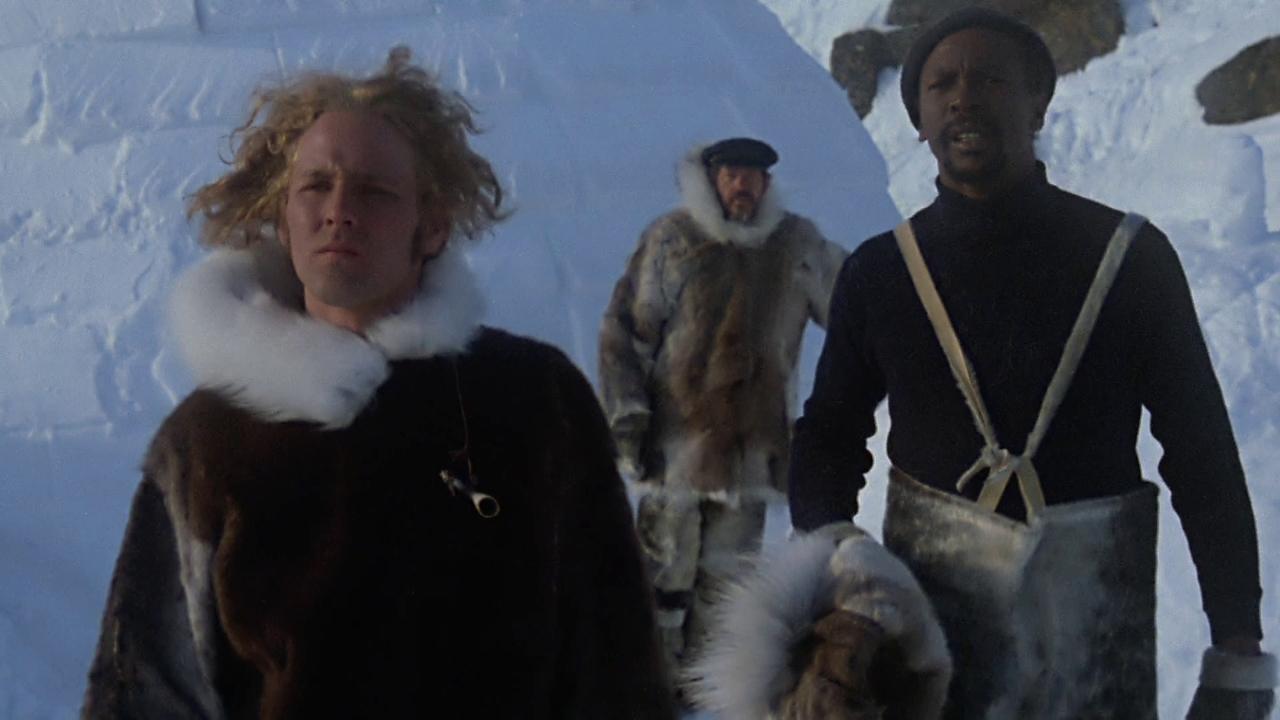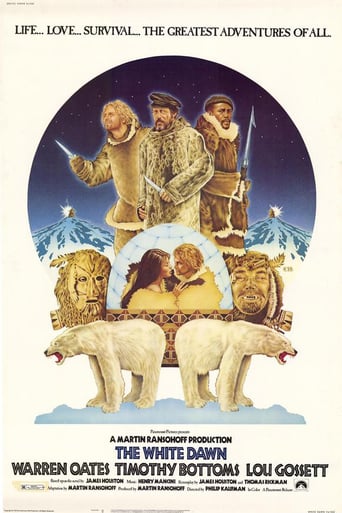


"The White Dawn" unfolds at a pace that I'm pretty sure many young people will be turned off by. There isn't really much of a plot here, for starters, and the movie unfolds at a pretty leisurely pace. Also, there isn't a terrible about of development for the characters played by Oates, Bottoms, and Gossett. But I have to admit that despite all that, I found the movie fairly captivating. The movie is slow, but it has a kind of hypnotic spell that kept me watching. Also, the depiction of the Inuit seems pretty authentic - I'm no expert on Inuit culture, but it sure seemed authentic. (One interesting detail is that it shows that the Inuit didn't have some sort of paradise lifestyle - they had problems like starvation, for example.) If you are looking for a movie that is quite different than usual - both in its subject matter and its telling - this movie is worth a look.
... View MoreTruth told there's something about the movie that doesn't work, something that stops it just short of fulfilling the potential promised by the setting, story, and talent involved. The problem is not that there's little of plot to speak of because this is the kind of movie that actually benefits from thin plotting but still something seems to be missing.It could be that the movie follows in episodic fashion the life and misadventures of three whalers stranded in Arctic Canada who are saved from certain death by a group of Eskimos but does so without urgency, capturing an evocative snapshot of Eskimo life, perhaps very faithfully, but still in a very Discovery Channel kind of way. Sure, bears and sea otters are slaughtered for food, but it's that, natives trying to survive in their natural habitat the only way they know, not castaways desperately trying to survive in a hostile world the only way they can. We don't see the three fishes out of water struggling to survive, most everything (food, shelter, even women) is provided for them by the friendly Eskimos.It could be that the movie is designed, conceived, as a mood piece yet is shot in a very generic by-the-numbers way. If Philip Kaufman captures no small amount of awe-inspiring shots of the glacial Canadian landscape where the movie was shot, it's because he had little more to do than point the camera at any direction around him to get them. You can imagine how much more potential someone like Werner Herzog could have milked out of a setting like this. The individual shots are good but the way they're strung together is mundane and workmanlike.It could be that for a grim and visceral 'man in the wilderness' adventure, WHITE DAWN is really not very grim or visceral. Kaufman doesn't allow a sense of urgency frostbitten danger or impending doom to seep in. When the three whalers make a run for freedom with a stolen Eskimo boat only to find themselves stranded in the ice again, an Eskimo conveniently shows up to lead them back to safety. Misguidedly the emphasis here is on picturesque rather than bleak. Compare how the three whalers are treated by the friendly wife-sharing Eskimos to the gruesome fate that is reserved in the hands of Algonquin Indians for the Catholic missionaries in Bruce Beresford's BLACK ROBE and the difference highlights a lot of what makes WHITE DAWN a mostly lighthearted affair.Still, not unlike Nicholas Ray's THE SAVAGE INNOCENTS, a lot of the small vignettes that show the whalers cohabiting with the Eskimos are a lot of fun to watch. Chief among the one where Warren Oates cons a man out of his two daughters in a knife-throwing betting contest. But unlike Ray's movie, THE WHITE DAWN hovers plot less, suspended between beautiful scenery and Eskimo customs, for a little too long.Perhaps it's the combination of all the above reasons that makes WHITE DAWN an interesting watchable movie, one closer to a hit than a miss. Warren Oates as the grizzly scruffy third mate is a pleasure to watch, this is the kind of character he could play with eyes closed and that's pretty much what he does. And then there's the ending, which I won't spoil, that couldn't have come from anywhere else than typically disillusioned 70's American cinema.
... View MoreLooking back from the 21st century, it is obvious that from the moment Columbus set foot in the new world the indigenous peoples of the Americas were doomed. It is equally obvious to a thoughtful viewer from 2005 that a movie made in 1973 about three shipwrecked whalers who are rescued by a band of Inuit and the resulting culture clash is going to end in tragedy. I knew the conclusion of "The White Dawn" as soon as I read two sentences of it's description on Netflix.But we shouldn't really hold that against it. Because "The White Dawn" is a very good movie and I am shocked that more movie aficionados haven't heard of it. I never did, and I am a fan of Philip Kaufman and Timothy Bottoms and movies of the 70s, and I have an interest in the arctic. This movie seems to have been buried under a rock somewhere, despite fine performances all around, beautiful cinematography and direction, and fascinating subject matter in the Eskimos.Filmed on location on Baffin Island in what is now Nunavet, the Inuit territory of Northern Canada, "The White Dawn" portrays the story of the three whalers - Timothy Bottoms, Louis Gossett Jr, and Warren Oates as they live with a sympathetic and friendly Inuit band over the course of a year, and how ultimately the interaction of the two world views leads to tragedy. It is based on the novel of the same name by James Houston, who lived with the Inuit for many years and based his novel on stories handed down through the generations of an actual event of 1897. In a fine performance, Bottoms is sensitive and open to the Eskimo way of life, falling in love with the woman Neevee. On the other hand is arrogant and exploitive Oates, who comes to represent the worst of "civilized" man's attitudes towards the Eskimo. He is dramatically counterbalanced by the equally manipulative Inuit Shaman, who pronounces that the whalers are bringing evil to the band of Eskimos.While the ending might seem preordained, "The White Dawn" is full of texture as it examines the meeting of cultures. And beyond the story itself, it is full of vivid and powerful images of Eskimo life, presented with apparently absolute realism by the amateur (but very good) Inuit cast. The joys and sorrows of the native's communal life are conveyed as they travel and hunt through the seasons. The highlights of the movie include a seal hunt, later a more desperate walrus hunt, and a winter dance in a large igloo, featuring the strange and wonderful throat chanting of two Inuit girls.A note for animal lovers - according to the commentary track, while seals and walruses were killed in filming, they were only killed if they would have been killed anyway, and the slain animals were completely utilized for food and fur by the Inuit (who do still hunt and rely on seals). The polar bear used in filming was not injured in any way.If you are a fan of the cinema of the 70s or movies in general, and are willing to accept the grim nature of the story, I highly recommend "The White Dawn". Certainly it should gain a wider audience and not be forgotten.
... View MoreI found this film to be rather dull although there was an honest attempt at portraying the Inuit as to how they lived back in the late 1800's. One thing that did actually occur was there have been many white explorers who showed up at all the Inuit shorelines. But those 3 explorers have been like all the other white explorers who didn't care one bit about Natives in general. The Inuit weren't immune to their detrimental ways. The Inuit took them in as their own as soon as they became stranded on their shores. However, it didn't matter to the 3 men. As it turned out, the Inuit had no other choice but to destroy them since they could no longer tolerate their shenanigans. But........... anyways.............. this is how I saw this film and why I gave it a 4 out of 10.
... View More